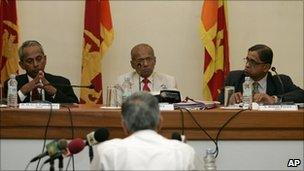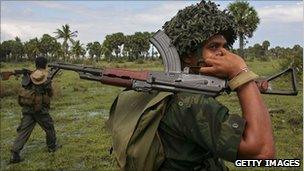Sri Lanka war panel hears Tamil grievances
- Published

The commission began public hearings in Colombo on Wednesday
A Sri Lankan government war commission has heard testimonies from Tamils alleging their loved ones were abducted or detained by the army.
Six people came forward to speak of their missing sons or husbands at the hearing in northern Sri Lanka, close to the former war frontline.
The panel has invited people to speak - either in public or in private - of their experiences of war.
The government has dismissed calls for an independent inquiry.
'Disappearances'
Sinnasamy Nallathamby, an elderly tailor, said his son was picked up in an army roundup in late 2008.
He was released by magistrates but, while on his way home, was abducted by people in a white van - a type of vehicle notorious in Sri Lanka for perpetrating forced disappearances.
A woman said her husband was also taken in a van and hadn't been seen since.
Others said they believed the military was holding their husbands, who had previously worked with the Tamil Tigers, but they lacked clear information.
Human rights groups have demanded an international probe into possible war crimes perpetrated during Sri Lanka's 37-year conflict with the Tamil Tigers, which ended last year.
The UN says it believes at least 7,000 Tamil civilians were killed in the final five months of the war during a government offensive against rebel-held territory.
The government disputes these figures.
'Reprisals'
The commission said it would pass the people's details to the relevant authorities.

Both sides have been accused of committing human rights abuses
The eight Sri Lankans chosen by the government to sit on the panel have been hearing from ordinary people in Vavuniya, a town now home to tens of thousands of Tamil war refugees.
Another complaint involved a man who said there was a broad perception among Tamils that they were being discriminated against in the courts.
The panel also heard allegations that the government was deliberately settling ethnic Sinhalese people in previously Tamil areas.
One constantly recurring theme was the poverty of people trying to resettle after the war, several saying they simply didn't have the resources to rebuild their lives.
The commission will also hold hearings in refugee centres and camps where thousands of men and women said to have links with the Tamil Tigers are detained for what the government calls rehabilitation.
The commission chairman has told the BBC that no one needs to fear testifying, as secrecy and anonymity can be guaranteed.
But a report by the US State Department this week cautioned that those who criticise the government in Sri Lanka run the risk of reprisals.